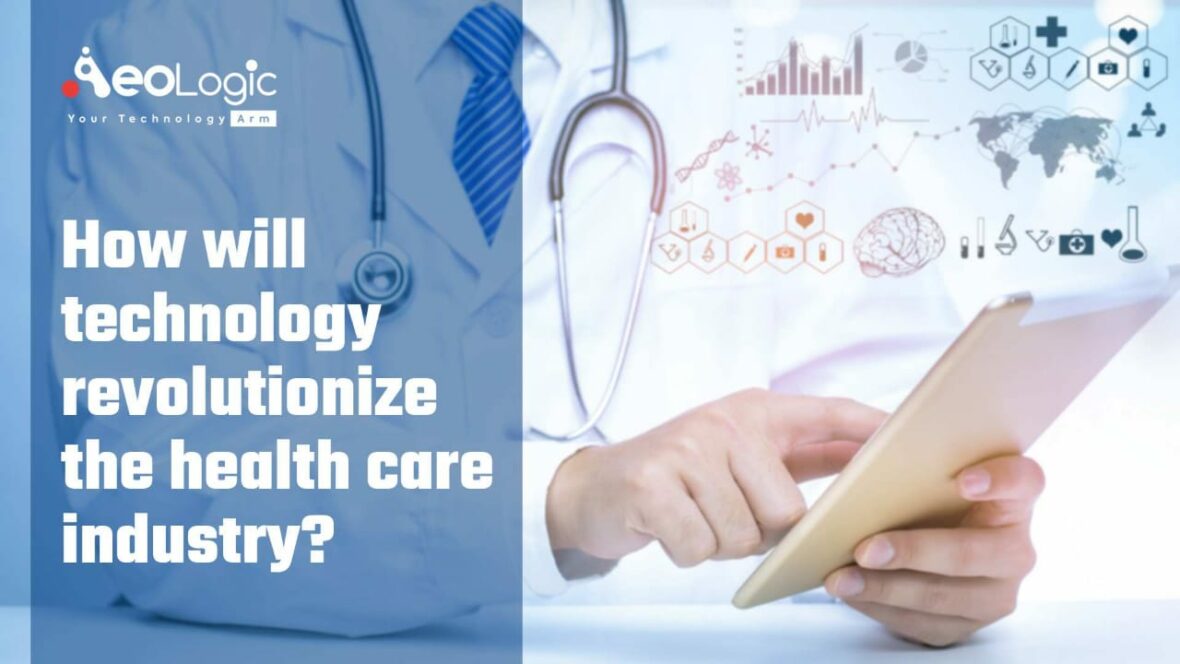How will technology revolutionize the healthcare industry? When we examine the current state of healthcare delivery, it is clear that we have numerous challenges to solve in order to make our healthcare system more effective. Long wait times and high costs are issues that touch all people and can affect the most vulnerable in ways we might not even imagine. So, in this blog, we will discuss how technology will revolutionize the healthcare industry.
We’ve all heard about health care technological breakthroughs. Health care IT is fascinating, from EMRs to biometrics to mobile apps and cloud services. Hence, a natural question arises with all these advancements—how will technology revolutionize the health care industry?
Let’s begin!
What’s Healthcare Technology?

Healthcare technology includes IT systems and software aimed to promote hospital and administrative productivity. It also brings new insights into drugs and treatments. So, the healthcare business today is a $2 trillion monster at a fork in the road. The sector is seeking methods to improve in every area, as it is now weighted down by crushing costs and red tape. So, that’s where health technology comes in. Tech-based tools are being added to every part of our healthcare experience to improve quality and efficiency, which are two of the biggest problems.
Also Read: 5 AI Trends that Are Changing the Face of Retail
Technology is Transforming Healthcare
So, we can say technology has revolutionized healthcare. Patients now have access to cutting-edge diagnostic equipment, novel treatments, and minimally invasive procedures that reduce discomfort and speed healing.
Remote consultations with physicians focused on treatments and intuitive mobile apps have enhanced patient care. Innovative treatment technologies with greater outcomes have also improved patient satisfaction.
Technology’s Impact on Healthcare
Single Database
As health care becomes more focused, most people see different specialists for different health problems. So, this means they have more records and need to work together more. Health informatics and healthcare IT make sure that electronic record-keeping and sharing helps patients have all their information in one place and easy to find.
Improves self-care
Digitalized and device technology in healthcare has made it possible for patients to directly access their own health records. Healthcare informatics systems give people the tools they need to take better care of their own health. So, it is easy to keep track of records for people who need to keep regular records, like people with diabetes who need to keep a daily record of their glucose and insulin levels.
Share Experience
Healthcare IT makes it easy to communicate knowledge about patients, diseases, therapies, medicines, and cases. As this expertise and access to information are shared in various circumstances, the whole medical fraternity, from hospital administrators to pharmacists, benefits.
Also Read: How Can Cloud Computing be Beneficial for the E-commerce and Retail Sector?
Better Results
With easier access to electronic medical records, care is better and safer because doctors can work together. Less work is needed for doctors and nurses to keep records by hand, which improves the efficiency of patient care.
Elements of Healthcare Technology
Digitization in Health Records
Digital records are securely uploaded to the cloud and made remotely accessible to patients and healthcare providers. This simplifies data storage, administration, and transmission. Professionals and patients have access to clinical decision support, allowing for more informed medical decisions. Digitizing health records improves efficiency and healthcare delivery to rural areas. Hence, it could expedite operations, enhance patient outcomes, and cut expenses.
Mobile Medical Apps
Another element is that patients can use apps to keep track of doctor’s appointments and take medications using their mobile devices. Apps that analyze food intake and activity levels and give customized solutions to help people get healthy.
These apps can aid doctors in high-stress occupations by eliminating filing, recordkeeping, and other regular activities. Mobile apps can assist in reducing adverse effects and interactions, alleviating difficulties, and improving diagnostics. Doctors can immediately engage with patients, monitor vital signs, keep logs of visits and consultations, and improve procedural efficiency.
The Cloud and Big Data
Big data has become a catchphrase in a variety of fields, including healthcare. This is due to the ability to generate and collect massive volumes of data from a variety of sources in the healthcare area. Data storage on the cloud increases efficiency and accessibility while lowering waste. This also assists in the research and development of innovative treatment methods and lifesaving medicinal compositions.
Cloud services also provide a large volume of research and analysis and facilitate health information sharing. The cloud delivers secure, cost-effective storage with backup and recovery functions without the inconvenience and cost of extra server hardware.
Also Read: How Digital Transformation is Changing the Retail Industry
Customized Care
Another way that technology is pushing our healthcare system forward is through the use of devices and wearable technology to improve patient participation. According to Zillion CEO Brent Wilkinson, such gadgets can generate information that can develop hyper-targeted, tailored health and wellness plans.
AI & AR
Combining two emerging technologies can expand medical treatment options. “Artificial intelligence is on a crash course with augmented reality, especially in healthcare,” says Adnan Raja.
He mentions AccuVein, a handheld device used by nurses and doctors to scan a patient’s body and reveal veins. Hence, this instrument can improve blood draws and IV insertions, reducing the need to poke a patient many times.
Also Read: A Complete Guide to Retail Automation Solutions and Strategies
Conclusion
In the healthcare industry, technology has a nearly limitless number of applications. Everything from hospital administrative processes to cancer research and surgery is using technology to improve efficiency and make the patient experience as comfortable as possible. So, healthcare providers who haven’t used technology tools are discovering their untapped potential and making adjustments and investments to streamline procedures, cut costs, increase efficiency, and improve service quality.
If you want to learn more about healthcare technology, connect with Aeologic Technologies.







